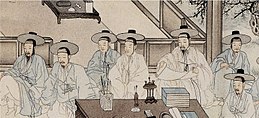
North Korea, officially the Democratic People's Republic of Korea (DPRK), is a country in East Asia. It constitutes the northern half of the Korean Peninsula and borders China and Russia to the north at the Yalu (Amnok) and Tumen rivers, and South Korea to the south at the Korean Demilitarized Zone. The country's western border is formed by the Yellow Sea, while its eastern border is defined by the Sea of Japan. North Korea, like its southern counterpart, claims to be the legitimate government of the entire peninsula and adjacent islands. Pyongyang is the capital and largest city.
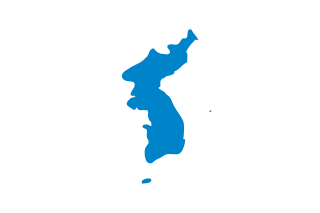
Korean reunification is the aspired unification of North Korea and South Korea into a singular Korean sovereign state. The process towards reunification of the peninsula while still maintaining two opposing regimes was started by the June 15th North–South Joint Declaration in June 2000, was reaffirmed by the October 4th Declaration in October 2007 and the Panmunjom Declaration in April 2018, and the joint statement of United States President Donald Trump and North Korean leader Kim Jong Un at the Singapore Summit in June 2018. In the Panmunjom Declaration, the two countries agreed to work to officially end the Korean conflict in the future.
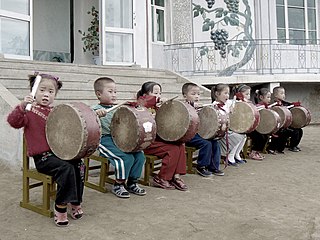
The music of North Korea includes a wide array of folk, hip-hop, light instrumental, political, and classical performers. Beyond patriotic and political music, popular groups like Pochonbo Electronic Ensemble and Moranbong Band perform songs about everyday life in the DPRK and modern light pop reinterpretations of classic Korean folk music. Music education is widely taught in schools, with President Kim Il Sung first implementing a program of study of musical instruments in 1949 at an orphanage in Mangyongdae. Musical diplomacy also continues to be relevant to the Democratic People's Republic of Korea, with musical and cultural delegations completing concerts in China and France in recent years, and musicians from Western countries and South Korea collaborating on projects in the DPRK.
The Sunshine Policy is one of the approaches for South Korea's foreign policy towards North Korea.

The Pyongyang Metro is the rapid transit system in Pyongyang, the capital and largest city of North Korea. It consists of two lines: the Chollima Line, which runs north from Puhŭng Station on the banks of the Taedong River to Pulgŭnbyŏl Station, and the Hyŏksin Line, which runs from Kwangbok Station in the southwest to Ragwŏn Station in the northeast. The two lines intersect at Chŏnu Station.

Pyongyang: A Journey in North Korea is a black-and-white graphic novel by the Canadian Québécois author Guy Delisle, published in 2003. The novel details the months Delisle spent in Pyongyang while working for a French animation company.
Korean April 26 Animation Studio, also known as SEK Studio, is a state-owned North Korean animation studio, based in Ot'an-dong, Central District, Pyongyang.

Empress Chung is a 2005 animated feature film, produced in North and South Korea and directed by Nelson Shin.

The cinema of North Korea began with the division of Korea and has been sustained since then by the ruling Kim dynasty. Kim Il-sung and his successor Kim Jong-il were both cinephiles and sought to produce propaganda films based on the Juche ideology.

The Catholic Church in North Korea retains a community of several hundred adherents who practice under the supervision of the state-established Korean Catholic Association (KCA) rather than the Roman Catholic hierarchy. The dioceses of the Church have remained vacant since Christian persecutions in the late 1940s. The most prominent congregation is that of Pyongyang, which meets at Changchung Cathedral. According to a KCA official, two other congregations exist. The state ideology of Juche has largely displaced Catholic faith, and full services are provided only to people with a Catholic family background.

Taedonggang (Korean: 대동강맥주) is a brand of North Korean beer brewed by the state-owned Taedonggang Brewing Company based in Pyongyang. There are four brands of beer marketed as Taedonggang, though the brand known simply as "Taedonggang Beer" is that described below.
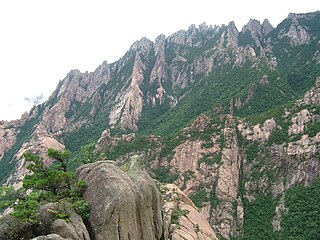
Tourism in North Korea is tightly controlled by the North Korean government. All tourism is organized by one of several state-owned tourism bureaus, including Korea International Travel Company (KITC), Korean International Sports Travel Company (KISTC), Korean International Taekwondo Tourism Company (KITTC) and Korean International Youth Travel Company (KIYTC). The majority of tourists are Chinese nationals: one 2019 estimate indicated that up to 120,000 Chinese tourists had visited North Korea in the previous year, compared to fewer than 5,000 from Western countries.

The Flower Girl is a North Korean revolutionary genre theatrical performance, which was written by the country's leader Kim Il Sung. The performance is considered one of the "Five Great Revolutionary Operas", a group of classical, revolution-themed opera repertoires well received within North Korea. It was also made into a novel. A film adaption of the opera starring Hong Yong Hee was made in 1972.

The Sŏngun Red Flag class is a group of electric locomotives manufactured by the Kim Chong-t'ae Electric Locomotive Works for the Korean State Railway.
The history of Korean animation, began with Japanese and American characters dominating the industry. The first sound animated character was created in 1936. The first Korean animation studio opened in Pyongyang in 1948. The first feature-length animated character appeared in 1967. Dooly the Little Dinosaur revolutionized the character market in 1987. As animation characters specific to Korea appeared, the Korean character market continued to grow. Since then, Korean character franchises have even exported their characters to other countries.

Squirrel and Hedgehog is a North Korean animated series made by SEK Studio (조선4.26만화영화촬영소). Squirrel and Hedgehog is one of the most popular animated series in North Korea. The show was supposedly discontinued in 2012, which was around the time North Korean state television changed its broadcasting schedule, which cut several animated programs along with it.
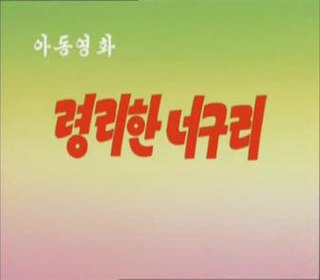
Clever Raccoon Dog is a North Korean animated television series produced by SEK Studio which aired on North Korean state television. The series was produced for a number of years and features both old and new animation styles, depending on the production year of each episode. The series focuses on three main characters, who are often involved in minor adventures or incidents. Each episode has a scholastic element or a particular message, focusing on matters as scientific information, road safety, sportsmanship, among others. The first 9 episodes are co-produced with the French animation studio Col.Ima.Son and P.M.M.P.

2000 inter-Korean summit was a meeting between South Korean president Kim Dae-jung and the Democratic People's Republic of Korea's supreme leader Kim Jong-il, which took place in Pyongyang from June 13 to June 15, 2000. It was the first inter-Korean summit since the Korean War 1950-1953.

The Kim–Xi meetings were a series of summits between North Korea and China during 2018 and 2019. North Korean supreme leader Kim Jong Un secretly met with Chinese paramount leader Xi Jinping on March 25–28, 2018. Xi made a classified invitation to Kim to visit China, after which Kim visited Beijing and used his bullet proof train to travel to the three-day meeting. It is his first known out-of-country diplomatic trip since taking power. Kim and Xi had a second surprise meeting on May 7–8, 2018 in the city of Dalian. Kim and Xi had a third surprise meeting on June 19–20, 2018. They had a fourth surprise meeting on January 7–10, 2019 in Beijing, followed by a fifth official DPRK and China summit June 20–21, 2019 in the Forbidden City, Pyongyang.

The Korea Stamp Museum is a postal museum in the Central District of Pyongyang, North Korea.
